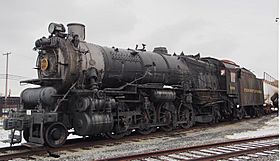Pennsylvania Railroad 520 facts for kids
Quick facts for kids Pennsylvania Railroad 520 |
|
 |
|
| Pennsylvania Railroad 520 on display at the Railroad Museum of Pennsylvania. | |
| Power type | Steam |
|---|---|
| Builder | Baldwin Locomotive Works |
| Build date | December 1916 |
| Configuration | 2-8-2 |
| Gauge | 4 ft 8 1⁄2 in (1,435 mm) |
| Driver diameter | 62 in (1,575 mm) |
| Length | 82 ft 1⁄4 in (25.0 m) |
| Weight on drivers | 232,500 lb (105,500 kg) |
| Locomotive weight | 324,700 lb (147,300 kg) |
| Tender weight | 447,300 lb (202,900 kg) |
| Locomotive and tender combined weight | 772,000 lb (350,000 kg) |
| Boiler pressure | 205 psi (1,413 kPa) |
| Heating surface: Firebox | 305 sq ft (28 m2) |
| Superheater area | 943 sq ft (88 m2) |
| Tractive effort | 61,465 lbf (273 kN) |
| Factor of adhesion | 3.78 |
| Retired | October 20, 1957 |
| Current owner | Pennsylvania Historical and Museum Commission |
| Official name: Mikado Freight Locomotive No. 520 | |
| Designated: | December 17, 1979 |
| Part of: | Pennsylvania Railroad Rolling Stock Thematic Resource |
| Reference #: | 79002269 |
Pennsylvania Railroad 520 is a powerful steam locomotive known as a "Mikado" type. It was built in 1916 by the Baldwin Locomotive Works for the Pennsylvania Railroad. This amazing engine was part of the L1s class and was used to pull heavy freight trains.
In 1942, the locomotive was involved in a serious incident where its boiler was damaged. A new boiler had to be built to replace it. After many years of service, the locomotive was retired in 1957. Luckily, it was saved for preservation. Today, you can see it on display at the Railroad Museum of Pennsylvania in Strasburg, Pennsylvania. It was even added to the National Register of Historic Places in 1979 because of its importance.
About This Amazing Locomotive
The L1s class of steam locomotives, which includes No. 520, was first developed in 1914. These engines were designed to replace an older type of locomotive called the H9s-class. The L1s locomotives used very similar boilers to those found in the famous K4s-class steam locomotives of the Pennsylvania Railroad.
When a new type of locomotive, the I1s, was introduced in 1924, most L1s locomotives were moved to other jobs. However, No. 520 continued its important work.
A Look at Its History
Locomotive 520 was built in December 1916 by the Baldwin Locomotive Works. It spent many years pulling freight trains for the Pennsylvania Railroad.
The 1942 Incident
On November 14, 1942, during World War II, locomotive 520 was pulling a freight train. It was traveling from Altoona, Pennsylvania to Conway, Pennsylvania. Near Cresson, the boiler on 520 had an explosion.
This powerful blast caused the tender (the part that carries coal and water) and six tank cars to derail. The explosion also shattered windows in a nearby house. People in the house were hurt by hot water and flying pieces, and a rug caught fire. After this serious event, locomotive 520 was repaired and put back into service.
Its Final Journey
On October 20, 1957, locomotive 520 had a special job. It pulled a "railfan special" train. This train carried people who loved trains from Baltimore, Maryland, starting from Enola to Northumberland, Pennsylvania.
After completing a round trip from Northumberland back to Enola, locomotive 520 was officially retired. It became part of the Pennsylvania Railroad's collection of historical locomotives. In December 1979, 520 was given to the Pennsylvania Historical and Museum Commission. This gift came from the Pennsylvania Railroad's successor, Penn Central. On December 17, 1979, it was officially listed on the National Register of Historic Places.

